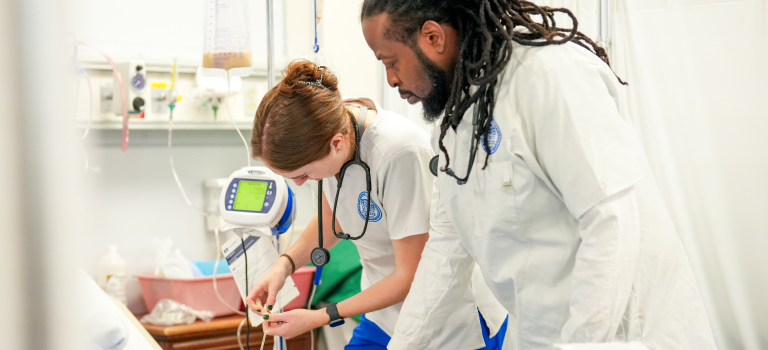Nursing (RN)

Overview
The Quincy College Associate of Science Degree in Nursing curriculum is based on sound educational principles and follows the mission, philosophy, and outcomes identified for the program and for the students. The curriculum design is a blended competency and concept-based curriculum. Delivery of the curriculum is through an active learning environment that encourages individual student contributions as they learn and achieve. This requires faculty to be actively involved with students in the classroom through mutual respect, responsibility, and collaboration. The teaching skills needed to deliver the concept-based curriculum require consideration of the diverse student backgrounds and perspectives that are represented in our student body.
The faculty also believe in delivering a curriculum that represents current nursing practice at the level of nursing for which the student is preparing. As demonstrated by the curriculum materials, the programs include the development of nursing critical thinking/clinical reasoning; leadership and management skills; professional role socialization (including legal, ethical, and professional responsibilities) consistent with the level of licensure; and, the ability to delegate, supervise others, and provide leadership. All these components are included in the curricula as required by the Massachusetts Board of Registration in Nursing, 244 CMR 6.04.
Nursing Application
Please contact Admissions Associate Jennifer Davis at jdavis@quincycollege.edu | (617) 984-1715
- Applications for the Fall 2024 semester will be open in October 2023. Contact admissions@quincycollege.edu for more information.
- Sign up for an Information Session.
- Scholarships are available for the Fall 2024 cohort.
Academic Division of Nursing Mission
The Mission of the Academic Division of Nursing is congruent with the mission, values, and goals of Quincy College. The mission of the nursing program is to prepare each graduate for success on the National Council Licensure Examination (NCLEX®) to ensure graduates safely practice nursing with professional competence and care holistically for individuals from culturally diverse backgrounds. The graduate will function as an integral member of the inter-professional team with a commitment to educational advancement and lifelong learning.
The Academic Division of Nursing at Quincy College provides clinical education for our students at top healthcare facilities and in community settings in Massachusetts including:
- Beth Israel Deaconess Plymouth
- Boston Medical Center
- Bournewood Hospital
- Hancock Park Rehabilitation & Nursing Center
- Hebrew Rehabilitation Center
- Life Care Center of Plymouth
- Quincy Public Schools
- Spaulding Rehabilitation Hospital
- South Shore Hospital
- Walden Behavioral Care
Board of Registration in Nursing
The Quincy College Associate of Science Degree in Nursing (ASN) program has full approval granted by the Massachusetts Board of Registered Nursing (MABORN). For more information, contact MABORN on the web at http://www.mass.gov/dph/boards or at 250 Washington Street, Boston, MA 02108, or by phone (800) 414-0168 or Alt. (617) 973-0900.
Effective 1/16/24, the ASN nursing programs at Quincy College at the Quincy/Plymouth campuses located in MA is a candidate for initial accreditation by the Accreditation Commission for Education in Nursing. This candidacy status expires on 1/16/25. Visit http://www.acenursing.org for more information.
NCLEX-RN® Pass Rates for Quincy Campus
| Year | ASN Graduates | First-Time NCLEX-RN® | MA Pass rate | National Pass Rate (U.S. Educated) |
|---|---|---|---|---|
| 2021 | 22 | 94% | 86% | 82% |
| 2022 | 21 | 73% | 82% | 80% |
| 2023 | 11 | Pending | Pending | Pending |
NCLEX-RN® Pass Rates for Plymouth Campus
| Year | ASN Graduates | First-Time NCLEX-RN® | MA Pass rate | (U.S. Educated) |
|---|---|---|---|---|
| 2021 | 18 | 89% | 86% | 82% |
| 2022 | 13 | 85% | 82% | 80% |
| 2023 | 13 | Pending | Pending | Pending |
Academic Division of Nursing
Nursing (RN) Courses
-
Code
Course
Credits
-
- RNU 108
Fundamental Concepts of Client Care
- 7
Total per semester: 60 hrs. Classroom / 30 hrs. Skills/Simulation Lab / 90 hrs. Clinical
Pre-requisites: ENG 101; MAT 103 or 107 (107 is preferred); BIO 111 with lab (this is a required prerequisite to BIO 131 and BIO 251); BIO 131 with lab -
- RNU 109
Concepts of Adult Health Nursing I / Mental Health Nursing
- 10
Total per semester: 75 hrs. Classroom / 30 hrs. Skills/Simulation Lab / 180 hrs. Clinical
Pre-requisites: RNU 108; ENG 102; PSY 101; BIO 132 with lab -
- RNU 206
Concepts of Family-Centered Nursing
- 10
Total per semester: 75 hrs. Classroom / 30 hrs. Skills/Simulation Lab / 180 hrs. Clinical
Pre-requisites: RNU 109; PSY 216 -
- RNU 207
Nursing Informatics, Leadership and Trends
- 3
Total per semester: 45 hrs. Classroom/Computer Lab
Pre-requisite: RNU 206; Co-requisite: RNU 208 -
- RNU 208
Concepts of Complex Nursing Care
- 10
Total per semester: 75 hrs. Classroom / 30 hrs. Skills/Simulation Lab / 180 hrs. Clinical
Pre-requisites: RNU 206; BIO 251 with lab; HIS or GOV course; Co-requisite: RNU 207

Admission Requirements
Fall 2024 Admissions: Must be completed PRIOR to submitting an application
- Proof of high school/GED completion
- Official transcripts from previously attended colleges (if applicable)
- Attend a Nursing Information Session
- HESI A2 Admission Exam
- ENG 101: English Composition I
- MAT 103: College Algebra OR MAT 107 Statistics (preferred)
- BIO 111: General Biology I w/lab
- BIO 131: Anatomy & Physiology I w/lab
- BIO 132: Anatomy & Physiology II w/lab
Prerequisites
- Accepted with a grade of C (73+) or better.
- All pre-requisites must be completed by May 2024
- Sciences must have been taken within the last 5 years (Fall 2019 or later)
- Some prerequisites can be satisfied upon a transfer evaluation of prior high school or college coursework
Co-Requisites: (preference will be given to those who have these completed PRIOR to the program)
- ENG 102: English Composition II
- BIO 251: Microbiology
- PSY 101: General Psychology
- PSY 216: Human Growth & Development
- HIS/GOV core (HIS 101, HIS 102, GOV 201 or GOV 211)
HESI A2 Admission Exam:
- MUST be taken on campus at Quincy College
- Maximum of 2 attempts allowed per academic year (must wait 30 days prior to retesting)
- There are required scores in each section. These scores must be met to be eligible and a composite score of 75%:
Math 75% English 75% Science 75% (Biology, Chemistry, A+P)
The Academic Division of Nursing will evaluate only those applicants who took the HESI A2 Admission exam on or after September 1, 2022. If an applicant fails to meet the minimum required scores indicated above, they may take the HESI A2 Admission exam a maximum of two times in an academic year (September 1st through August 31st). Applicants must wait 30 days prior to each retest. Applicants will be required to retake all sections. HESI A2 Admission exam registration is available by emailing kzimmerman@quincycollege.edu.
Please Note: At this time, Quincy College’s Nursing program can only accept applicants who are Massachusetts residents due to onsite program requirements.
Preparing for the HESI A2 Admission Exam
The HESI Admission Assessment (A2) tests program applicants in three main academic areas – English Language, Math, & Science. This test is designed to assess the academic and personal readiness of prospective students in nursing and health professions.
Preparing for the HESI Admission Exam for Fall 2024 Enrollment
Instructions
HESI publishes a review book specifically for this exam, HESI Admission Assessment Exam Review 6th Edition. This book can be bought online or at bookstores such as Barnes and Noble and is also available for purchase through Quincy College’s Barnes & Noble campus bookstore. The book will include samples of test questions from the subject areas that will be covered on the HESI Exam as well as information about test question formats. It will highlight important concepts and provides tips for studying and test-taking. It also offers a 25-question pre-test at the beginning of the review book that helps you assess your areas of strength and areas requiring more preparation before using the review book, along with a 50-question comprehensive post-test that covers all of the text’s subject areas. The questions will also include rationales for correct/incorrect answers. Other online preparation courses, flash cards, and review materials are available via an internet search.
When to take the HESI A2 Exam
Students typically take the HESI Exam during the fall or spring semester immediately prior to applying to the ASN program. The HESI A2 must be taken on-campus at Quincy College. You are allowed up to 4.5 hours to take the HESI A2 Admission Exam.
Required Scores
An applicant may take the HESI A2 up to two times within two years prior to the start of the nursing program September 2024. A 30-day wait period in between testing is required. The required composite score is 75% (Sub-score on each sub-category must be 75% or better).
Note: Please review the Preparing for the HESI A2 Exam handout for the specific categories. Please note that Physics is not included as part of the Quincy College Admission HESI A2 Exam.
Cost
The cost of the HESI A2 is $61.00 payable via a link sent to you when you register for the exam date. Contact Kara Zimmerman, Educational Services Associate at kzimmerman@quincycollege.edu to reserve a seat for the upcoming HESI A2 Exam test dates.
You might also be interested in...
-

Nursing (LPN)
Quincy College's Certificate of Completion in Practical Nursing, is a blend of Nurse of the Future Competencies and concept-based curriculum.
-

Admissions
Becoming a Quincy College student is as simple as meeting with one of our Admissions Associates.
-

Areas of Study
Quincy College is a unique learning environment where cultures meet, join forces, and weave a global context around college academics.
-

Certified Nursing Assistant
The Certified Nursing Assistant Program prepares students to take the MA State CNA exam & become a member of (DPH) the professional registry.


